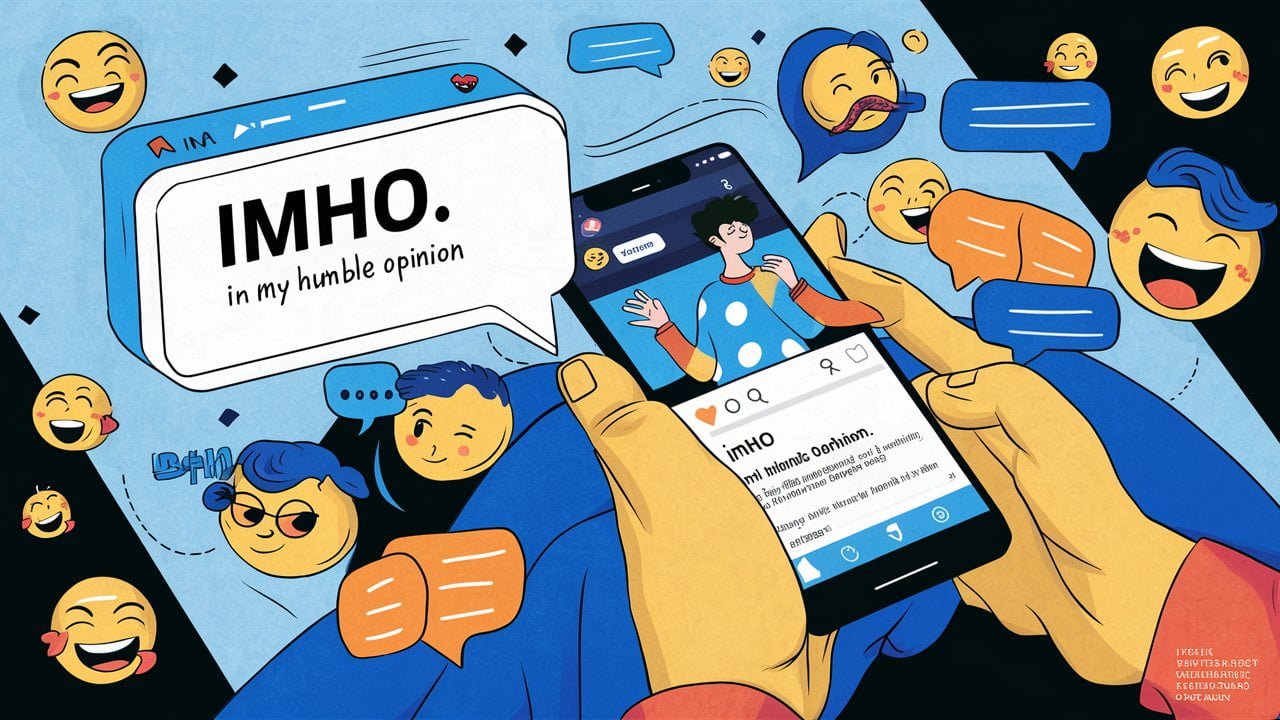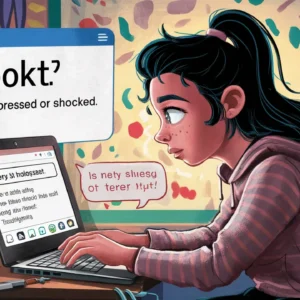Have you ever scrolled through your social media feed and come across the abbreviation “IMHO” multiple times, wondering what it really means? In today’s digital age, grasping the nuances of social media language is crucial for effective communication. IMHO stands for “in my humble opinion,” but its significance reaches far beyond mere informed expression.
Understanding the layers behind IMHO unlocks a gateway to decoding the intricate web of online interactions and personal statements flooding our screens daily.
In a world where brevity reigns supreme, abbreviations like IMHO hold immense power in shaping how we engage with others on social platforms. Each keystroke of ‘IMHO’ carries weight, subtly framing opinions within conversations among millennials, Gen Z, and avid social media users.
By unraveling the complexities intertwined within this seemingly simple acronym, we gain insight into not just what’s being said, but also how it’s being perceived in the vast landscape of digital dialogues.
Embracing the essence of IMHO goes beyond deciphering letters—it invites us to navigate the evolving terrain of online language dynamics with precision and finesse. So let’s delve deeper into the realms of IMHO on social media together, unveiling its true essence one post at a time.
Decoding IMHO.
IMHO, an acronym for “In My Humble Opinion,” has become a ubiquitous part of online communication among millennials and Gen Z users. This abbreviation serves as a disclaimer that the following statement represents the speaker’s personal viewpoint or perspective rather than an absolute truth.
The origins of IMHO can be traced back to the early days of internet forums and chat rooms, where brevity was key in expressing opinions or feedback concisely. Over time, IMHO has transitioned from being solely humble to also encompassing a sense of sincerity and authenticity in digital dialogues.
The evolution of IMHO within social media discourse reflects a shift towards more casual and informal communication styles among younger generations. Millennials and Gen Z users value authenticity and individual expression, using IMHO as a tool to convey personal beliefs or sentiments without appearing overly assertive or confrontational.
Common contexts where IMHO is often employed include discussions on pop culture, politics, or personal anecdotes shared on platforms like Twitter, Reddit, or Instagram comments sections. For example, a tweet stating “IMHO, the latest movie release was quite disappointing” highlights how this abbreviation softens the opinion while still making it clear that it is subjective.
In online conversations, IMHO plays a crucial role in fostering open dialogue by encouraging diverse perspectives and promoting respectful exchanges of ideas. By prefacing statements with “In My Humble Opinion,” individuals can express themselves confidently while acknowledging that others may hold different viewpoints.
This nuanced approach to sharing opinions helps create a more inclusive environment where discussions can thrive without devolving into arguments or conflicts based on differing beliefs.
Understanding the Impact of IMHO.
When it comes to understanding the impact of “IMHO” on social media, it’s crucial to recognize how this abbreviation can significantly influence the tone of a message. “IMHO,” standing for “In My Humble Opinion,” serves as a disclaimer for individuals expressing their thoughts online.
It adds a touch of humility or modesty to one’s statement, signaling that the opinion shared is personal and subjective rather than an absolute truth. In this way, using “IMHO” can soften the potential assertiveness or dogmatism in online discussions, fostering a more open and respectful dialogue among users.
The role of “IMHO” extends beyond just indicating personal opinion; it also plays a key part in shaping how individuals express themselves on social media platforms. By prefacing their perspectives with “IMHO,” users can navigate differing viewpoints while still asserting their stance.
This nuanced introduction helps users participate in debates or discussions without coming across as imposing their beliefs on others. Moreover, incorporating “IMHO” can make one’s input more inviting for feedback or counterarguments, encouraging constructive conversations rather than confrontations.
Perception-wise, individuals who frequently use “IMHO” in their posts or comments may be viewed as considerate and self-aware communicators within online communities. Their choice to include this abbreviation reflects an awareness of diverse opinions present on social media and a willingness to engage in discourse respectfully.
Instead of appearing overly dominant or rigid in their viewpoints, those who utilize “IMHO” demonstrate openness to dialogue and exploration of various perspectives. This practice not only enhances communication etiquette but also contributes to building positive relationships with fellow users by valuing mutual respect and understanding.
Alternatives to IMHO.
When it comes to expressing opinions on social media, IMHO is just one of the many abbreviations used by millennials and Gen Z users. An alternative commonly seen is “TBH,” which stands for “to be honest.” While IMHO suggests the opinion is the speaker’s personal view without imposing it on others, TBH adds a layer of candidness, emphasizing truthfulness in statements made online.
Choosing between IMHO and TBH could depend on whether the user aims to soften their opinion (IMHO) or provide a more straightforward insight (TBH) in a particular context.
Another prevalent abbreviation in the realm of expressing opinions digitally is “FWIW,” which stands for “for what it’s worth.” Unlike IMHO that implies a subjective viewpoint, FWIW allows users to share information with others while subtly indicating that they are leaving it up to the recipients to decide its relevance or value.
The distinction between using IMHO, TBH, or FWIW can greatly impact how opinions are perceived by the audience and underscores the importance of selecting an appropriate abbreviation for clear communication in various scenarios.
In specific conversations where individuals seek validation for their thoughts rather than asserting them as absolute truths, the acronym “IDC” (I don’t care) might be employed. Compared to IMHO, IDC conveys a somewhat indifferent stance towards differing viewpoints rather than offering one’s perspective for consideration.
Understanding these nuances becomes crucial when choosing which abbreviation best suits the tone and intent behind sharing opinions within different online dialogues. By being mindful of these alternatives and their implications, social media users can enhance the effectiveness of their digital communications while catering to diverse interaction styles across platforms.
Challenges and misinterpretations.
Challenges and misinterpretations can arise when navigating the abbreviation IMHO in diverse cultural contexts or age groups. What may seem like a straightforward acronym to one person could be puzzling or even take on an unintended meaning to another.
For example, in some cultures where hierarchy plays a significant role, expressing opinions openly with an assertive “in my humble opinion” can be seen as contradictory or even disrespectful due to the perceived lack of humility in such a statement.
Moreover, misunderstanding the true essence of IMHO without proper knowledge of its origins and usage can lead to misconceptions. Imagine a scenario where a seasoned social media user posts about a controversial topic using IMHO to soften their viewpoint, believing it conveys modesty.
However, a newcomer to online communication interprets this abbreviation as ‘In My Honest Opinion,’ perceiving it as an invitation for candid feedback rather than a humble assertion, leading to confusion and potential conflict in discussions.
Instances of miscommunication and conflicts online have been linked to the misuse of abbreviations like IMHO. For instance, during debates on social media platforms involving sensitive topics, participants might inadvertently misuse IMHO by expressing strong opinions while still including the abbreviation.
This contradictory approach can create rifts within conversations as recipients struggle to discern the intended tone—resulting in arguments fueled more by linguistic nuances than by the actual content being discussed.
Social Media Etiquette with Abbreviations.
In the digital realm, understanding social media etiquette is crucial when incorporating popular abbreviations like IMHO into online conversations. One of the best practices includes being mindful of the context and audience before using abbreviations to ensure effective communication.
For instance, while chatting informally with close friends on a messaging platform, using IMHO might be suitable for expressing personal opinions casually. However, in a professional setting or when engaging with a wider audience on platforms like LinkedIn, it is essential to maintain a balance between informal expressions and formal writing conventions. This balance can help convey your thoughts clearly without compromising professionalism.
Maintaining professionalism while utilizing casual language such as abbreviations like IMHO involves considering the tone and impact of these abbreviations within different online spaces. For example, in a heated debate on Twitter where opinions are flying back and forth, inserting IMHO at the end of a tweet can soften your stance slightly by signaling that you are presenting your viewpoint humbly.
This practice showcases an understanding of social media dynamics where nuances matter in shaping interactions. By being aware of these subtleties, individuals can navigate various digital environments effectively while ensuring their messages are received as intended.
Balancing informal expressions like IMHO with formal writing conventions becomes essential in scenarios where clarity and respect for diverse audiences are paramount. For instance, if you are participating in an online forum discussing academic research findings, avoiding too many abbreviations including IMHO may be advisable to uphold the seriousness of the conversation.
In such settings, opting for clearer language might enhance comprehension among participants from different backgrounds or expertise levels. By striking the right balance between informal shorthand like IMHO and articulate discussions when necessary, individuals can cater to diverse preferences while upholding decorum across social media platforms.
Impact on Online Interactions.
The frequent usage of abbreviations like IMHO plays a crucial role in shaping digital interactions over time. When individuals incorporate IMHO into their online conversations, it often creates a sense of informality and camaraderie among participants.
This shorthand can facilitate quicker exchanges of opinions and ideas, fostering a more dynamic and engaging environment on social media platforms. Over time, the consistent use of IMHO may lead to the establishment of a unique online community language that bridges generation gaps and cultural differences.
Positive outcomes from utilizing common social media shorthand like IMHO include increased efficiency in communication and enhanced relatability among users. For instance, in group discussions about popular culture trends or societal issues, employing IMHO allows individuals to express personal viewpoints succinctly while encouraging others to chime in with their perspectives.
This shared language not only streamlines discussions but also fosters a sense of unity among virtual communities. Additionally, the casual nature of using abbreviations like IMHO makes interactions feel more approachable, encouraging diverse voices to share their opinions without fear of judgment.
However, there can be negative consequences associated with overusing or misinterpreting expressions like “IMHO” within online communities. Misunderstandings may arise when individuals misinterpret the intended tone or sincerity behind someone’s usage of IMHO in a comment or post.
In some cases, excessive reliance on shorthand abbreviations like IMHO may come across as disingenuous or insincere, dampening the authenticity of digital interactions. Therefore, striking a balance between incorporating these abbreviations for efficiency while maintaining genuine communication is essential to prevent miscommunication and preserve meaningful connections within online spaces.
Navigating the Social Media Lingo.
Understanding abbreviations like IMHO is more than just deciphering a message; it’s about respecting and adapting to the diverse communication styles that exist across generations on social media platforms.
Decoding these shorthand forms not only enhances our digital interactions but also fosters inclusivity by bridging the gap between different age groups and online communities. By embracing and comprehending terms like IMHO, we can create an environment where opinions are shared freely and understood respectfully.
In a world where brevity and speed matter, knowing what IMHO really means goes beyond knowing the letters—it means understanding people. So, next time you encounter IMHO or any other social media abbreviation, remember
it’s not just about letters strung together; it’s about connecting with others through language in all its evolving forms. Let’s keep decoding, learning, and communicating in ways that make us more united amidst the digital tapestry of opinions and voices on social media.



